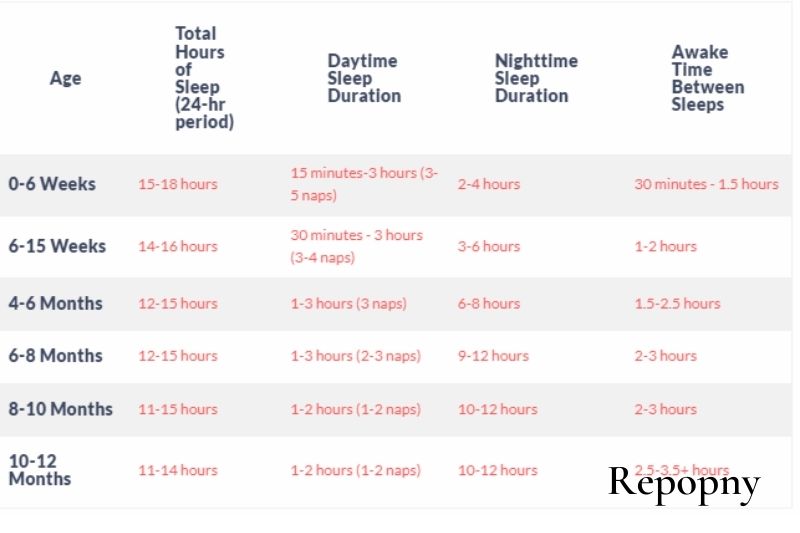Most newborns sleep between 16 and 20 hours a day, but some may sleep 22 or 23 hours. So why do newborns sleep so much?
Newborns are growing at an incredible rate. In the first few months of life, babies double their birth weight and produce about 10 inches. All that growth takes a lot of energy, and newborns sleeping too much helps them conserve energy.
Sleeping Patterns of Newborns
Your kid will be awake for approximately an hour or two after birth before falling into a deep slumber – they’re as tired as you are after being brought into the world! It won’t be easy to keep them awake during feedings. No worries, the hospital personnel will assist you in maintaining a steady eat-sleep pattern during this period.
Before you take your baby home, you’ll spend this time snuggling with them, learning about newborn care, and bonding with them. The pattern may last anywhere from 12 to 18 hours, and it will be ended just in time for you to depart for your new family’s house.
Your infant will become more attentive and awake throughout the next 24 hours. They’ll fall into the traditional newborn rhythm of awake, eat, and fall asleep. This trend will continue for the rest of her first month and possibly into the second.
Most babies sleep about 75% of the time while they are newborns! As seen in our infant sleep chart below, the number of hours babies sleep each day will gradually decrease as they get older. In our article Simplifying Baby Sleep: Birth to 3 months, we go through how and very young babies and newborns sleep.
Are Newborns Supposed To Sleep All The Time?
Definitely! Life outside the womb for a baby can be overstimulating once they’ve been born. They’ve just spent nearly a year in the warmth and security of your belly, so in those first few weeks, they’ll sleep for two-thirds of the day and eat for the rest.
Their bellies are so minor that they fill up quickly. So, even if they only eat for a short time, they’ll keep waking up to be fed in between naps.
Young babies sleep a lot since they’re used to what their small bodies require. Most babies take four or more short naps during the day. Thus much newborn sleeping will inevitably occur during daylight hours.
How Much Sleep Do Newborns Get?
The short answer is yes quite a bit. Newborns (0-15 weeks) can sleep up to 18 hours in 24 hours, as seen in the chart below.
Because each infant is different, the durations are always given in the form of ranges. Some children, like adults, sleep newborns deeply while others sleep lightly. For the first few months, some people may not be able to stay awake for more than 30 minutes between naps, while others may be awake for up to an hour or more.
Another thing to consider is that new sleeping habits may not follow a predictable baby’s sleep schedule. Their sleep patterns can be inconsistent before they are 3-4 months old; the only thing you can bank on is that there will be a lot of it!
Enjoy this moment because it isn’t going to continue forever! The patterns will shift over time, and as they become older, they’ll require less sleep daily.
How Much Sleep Does a Newborn Need? Is it possible that my infant is sleeping too much?
A newborn baby sleeps more than awake, which may seem strange. It may not appear that way to some sleep-deprived parents battling to recover their breath in between their wailing baby’s very short asleep. However, some babies will sleep for extended periods and need to be roused up to be fed.
EXPERTS’ OPINION
“Sleep happens around the clock for infants throughout the first several months, and the sleep-wake cycle interacts with the desire to be fed, changed, and loved.” Newborn babies sleep for 10.5 to 18 hours every day, with periods of one to three hours spent awake. Sleep can last anything from a few minutes to several hours.”
– Sleep Foundation of America
Newborns don’t have an internal biological clock when they are born; it develops over the first several months. Your infant won’t have a consistent wake-sleep cycle until they are 3 to 6 months old. They’ll spend 75% of their time sleeping and 25% of their time awake and nursing.
If you are wondering when a baby can sleep with a blanket, read our article.
When Should You Wake Up Your Baby?
The only time you should interfere with your newborn’s sleep is to ensure they are well-fed, which should happen every 2.5 to 3 hours. Breastfed newborns will eat 8 to 12 times per day. In contrast, according to the American Academy of Pediatrics, bottle-fed babies will eat 5 to 8 times per day (formula takes longer to digest, so the baby stays fuller for longer).
It’s good to schedule feedings every 2 to 3 hours or consults your pediatrician for advice, depending on your baby’s needs. Your baby will be weighed at each pediatric visit to verify that they are growing enough weight and eating enough food.
If you have any concerns about your baby’s asleep or eating patterns between planned visits, don’t hesitate to contact their doctor.
EXPERTS’ OPINION
“In the first few days following delivery, most babies lose weight. It’s critical to feed your newborn frequently until they regain their lost weight, which usually happens within one week after birth. This could require awakening your baby for a meal now and then, especially if she sleeps for more than 4 hours.
It usually’s OK to wait until your newborn wakes up for feedings if they start a weight increase pattern and pass the birth-weight milestone.” – The Mayo Clinic’s Elizabeth LaFleur, R.N.
It’s OK to let your baby quiet sleep as long as she’s gaining weight at a healthy rate (as established by your doctor). Many babies will wake up on their own if they’re hungry, but you’ll have to wake them up yourself if they don’t. During the first several weeks following delivery, this may be the case.
If your baby continues to sleep a lot, acts lethargic, and has to be roused up every time for a feed after the first couple of weeks, you should see your pediatrician.
Encouraging Standard Sleeping Patterns
Here are a few things you can do to encourage regular sleeping (and eating) patterns:
- During the day, take your kid on a walk to expose them to natural light.
- Create a relaxing nighttime routine that involves taking a bath, getting a massage, and nursing.
- Remove some layers of clothing to make them less warm and more likely to wake up when it’s time to feed.
- Before switching them to the other breast, try stroking their face with a damp washcloth or lifting them to burp.
- Your kid may become overtired if they receive too much stimulus during the day. Despite being famished, they may fall asleep.
- You could also keep track of their REM (rapid eye movement) sleep stage. This is the stage of light sleep.
- You should be able to wake up your kid more readily during REM sleep than when they are in a deep sleep stage. However, keep in mind that light and deep sleep stages alternate more frequently than in adults in babies.
Security In The Sleep Of A Newborn
First and foremost, make sure you’re assisting your infant is sleeping safely. The American Academy of Pediatrics (AAP) healthy sleep standards should be familiarized by all parents:
- Always put your infant to ssleep on their back.
- For sleeping, place the baby on a solid surface free of loose bedding, cushions, or stuffed toys.
- Share a room but not a bed.
Sleeping is so important for babies, maybe this guide can provide some useful information for you: How Long Does 4 Month Sleep Regression Last?
How To Assist Your Newborn In Sleeping
Due to weariness, overstimulation during the day can lead your baby to sleep too little or asleep when they should be eating. If your baby is awake for too long between naps, they will become overtired, which will make them cranky and difficult to settle for asleep. Here’s how to assist your infant in falling asleep and start developing good sleeping habits:
1. Teach the difference between night and day: If your baby seems to sleep a lot during the day but is fully awake when it’s time to go to bed, it could indicate that their days and nights are mixed up. Remember to keep the evenings dark, tranquil, and free of activity. A consistent bedtime routine helps children recognize when it’s night and time to retire. Before naps, you might follow a similar procedure, but make it shorter.
2. Create a relaxing environment: White noise, light-blocking drapes, and a pleasant temperature will help your infant sleep better.
3. Establish a consistent bedtime routine, including feeding, swaddling, shushing, rocking, and finally falling asleep.
4. Establish good newborn sleep patterns by putting your infant to bed drowsy yet alert. This technique is critical for helping your infant develop appropriate sleeping habits beginning around 3.5 to 4 months of age and continuing throughout their first year.
When Should You See A Doctor?
If you’re unsure, get medical advice. Only a specialist can accurately diagnose why a newborn is napping excessively. A pediatrician may be able to diagnose the problem over the phone in many circumstances.
Excessive sleep in a baby is usually not a cause for concern unless they simultaneously exhibit respiratory distress signs. If any of the following apply, contact a doctor or go to the emergency room:
- The baby is wheezing or gasping for air.
- The baby’s breathing is audible.
- When the baby breathes, its nostrils flare.
- When the infant breathes, the skin around their ribcage sinks in.
- There is a fever in the baby.
- Something harmful may have been inhaled, touched, or eaten by the baby.
Conclusion
Newborns sleep a lot because they are increasing. They have a lot of energy to burn, and the best way to save it is to sleep. Sleep does more than conserve energy.
Sleep is critical for healthy babies’ development. Sleeping helps regulate the baby’s body temperature, blood pressure, heart rate, and breathing rate. Thanks for reading. Repopny hopes this guide is useful for you.






